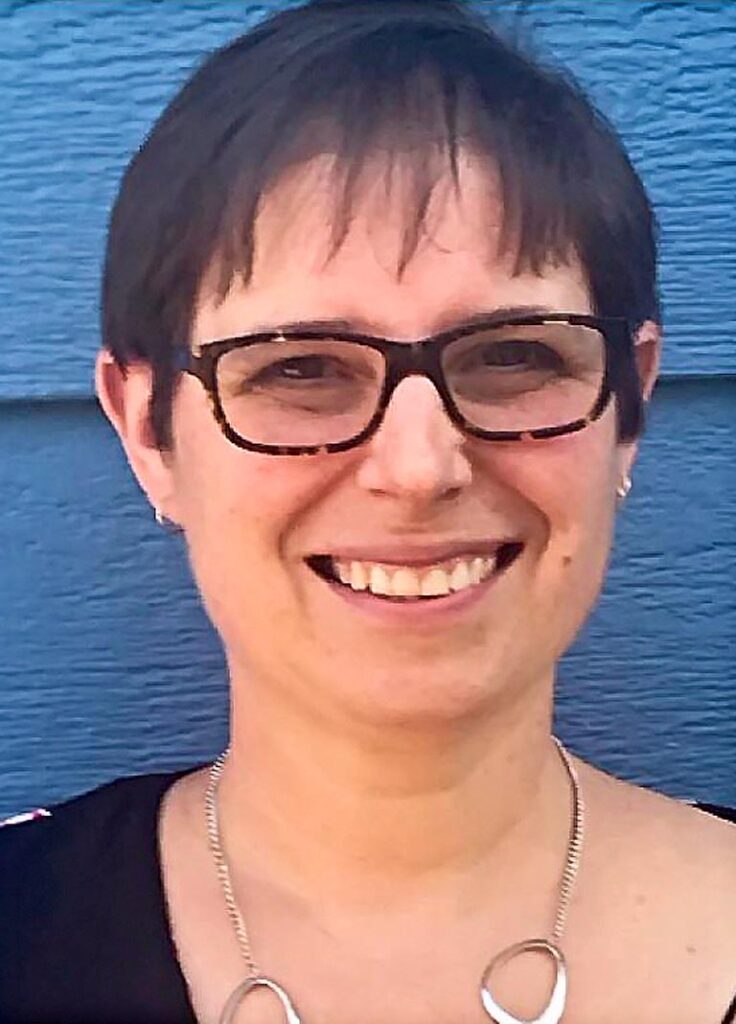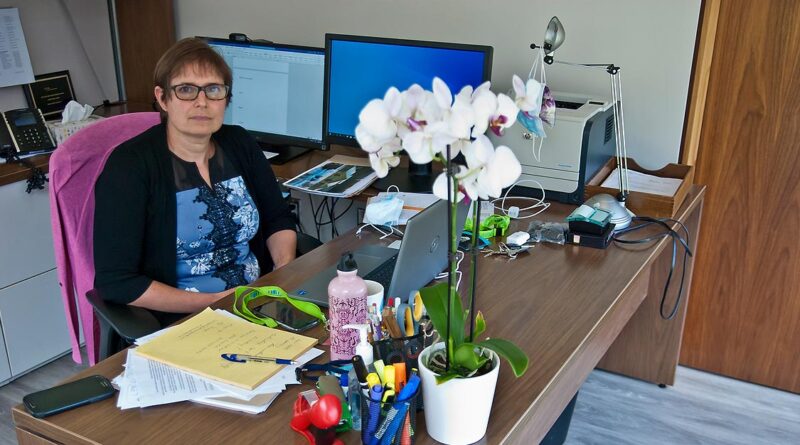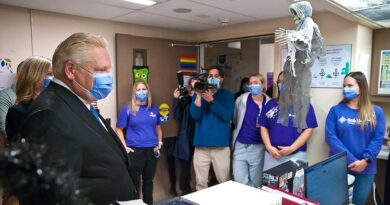Meet The New Library CEO
By John Swartz
The Orillia Public Library has a new leader. Bessie Sullivan started June 21 with what looks like the smoothest transition of leadership for the library in decades.
“The board hiring me to overlap with Suzanne (Campbell) for a week was a fantastic opportunity, for both of us I think,” said Sullivan. Campbell’s last effective day was June 25, even though her official retirement is July 31.
Sullivan was also afforded something rarely seen when top management changes.
![]()



“I was actually in on some hiring prior to starting because there were some vacancies and the former CEO, Suzanne, was very considerate because she didn’t want to leave a bunch of vacancies to fill, but she also didn’t want me to not be part of that decision making. I thought that was incredibly considerate. It’s nice to come in with people you hire.”
Speaking with SUNonline/Orillia two days ago, Sullivan was still in the process of meeting all of the 22 staff members. The library staff has evolved into a group of creative people dealing with a daily visitor count higher than expected, meeting the demand for programs (especially in the children’s department) and coming up with ways to meet the challenges of the pandemic.
“So far I think the staff is incredibly strong. I just came from meeting with the directors and they are assuring me my perspective is accurate. I also think, in general, libraries attract that kind of person; that person who is creative, energetic, really interested in serving their community. This is my third library and 23rd yr in the profession and I’ve always worked with really wonderful, really creative, energetic people.”
Sullivan was previously the CEO of the Haliburton County Public Library, and beforehand manager of three branches of the Kingston Public Library. Her resume also includes executive positions with the Urban Libraries of Ontario and the Ontario Public Library Association. We have an award winning building which still feels new, even though it’s 9 years old, and the services offered are innovative and leading edge, but why would an established executive want to make a change now.
“The building was one of the attractions, for sure. It’s wonderful to have this much space dedicated to a library. It’s a stunning building,” said Sullivan. “I knew I needed a change. CEOs in any place like a corporation, or in this case a library, there’s a shelf life, and I think I had surpassed mine. I think I actually was about 2 years past where I should have left (Haliburton). In terms of being effective in leadership, being effective with the relationship to building outside of the library, I think you just need somebody with new ideas. That’s why I needed a change.”
“I think you can get really complacent and I think an organization does too without some shuffling every once in a while. I think in the school system they change up principals and they usually do it every 5 years; there’s a reason for that.”
“Orillia specifically, I like the size of the City. I like that it’s still sort of north of Toronto. I like the proximity to where I am.” She also mentioned medical services saying there are no specialists in Haliburton and she was already travelling at times to Orillia for appointments. “I’ve already been wandering around a lot. Compared to Haliburton this is big city. It may not seem like to people of Orillia, but it does to me. I’ve been shopping pretty much every night I’ve been here because there’s stores, which is exciting to me. Oh, haircuts, booking haircuts for when we are actually allowed to do that; I have one for next week, here. One thing about Orillia I really like is how easy it is to get around.”
It sounds like she likes to explore, which with the next bit of information may seem like an strange observation, but she really did take the job offer blind.
“That was the bazaar thing about getting a job in the middle of a pandemic. I rented an apartment sight unseen, I committed to a library job without ever having seen the (inside of the) library and I interviewed by Skype, so all those things were a little odd,” she said. “It’s an adventure.”
One thing she won’t get with the new job is headaches in bunches. Libraries are locally funded and that means sometimes having to expend a lot of energy to get budget approvals.
“Libraries are put in a tough position. The Library Act is really clear about the autonomy of libraries, but they are relying so heavily on their municipalities in this case for a lot of their operating budget. They are not like the health unit who can just bill, or the board of education you can just bill the City,” Sullivan said. Commnicating with elected officials is necessary. “It’s a tightrope for sure. The board chair does some of that, but it’s definitely part of the CEO’s job.”
“In actual fact, that was another attraction for me is having everything in one building and having that central simplified that for me. The thing about the Haliburton model is it’s a county system, so you are working with the county, the direction comes from your board, but county council has the purse-string, but you then have 4 member municipalities, so you are dealing with four more councils. You could say because you have the contracts (with Severn and Oro-Medonte Townships) here they are the same, but not really.”
“I know what I’m interested in and what I’m not interested in and I really wanted to put my energies and time into services and programming and things like that that are so important, rather than the politicking and I thought there’d be a reduction in that with one council as opposed to five.”
Some people think libraries are a dying institution, but as current history illustrates amply, one still needs the skills of librarians to select materials and to point people in the right direction of trusted information – that will likely never change and a computer mouse is no replacement.
“They’re evolving. In fact, I think libraries are one of the more nimble organizations out there. Yeah, there’s more and more use of downloadable products, but libraries are divided into three categories. You’ve got your space, you have technology, and you have information seeking and how you use those three things depends, so if your information seeking is through hardcover that’s one thing, (or it could be) through technology.”
She thinks the staff programming idea to give people the sense the library is still in business even though it’s been closed is a great example of meeting demand in short order.

“They (staff she had just met with) were just telling me about a bunch of different initiatives. Downstairs they are doing little Surprise Bags; with movie nights, in the pack comes microwavable popcorn.” People can fill out an online questionnaire about their interests and needs and staff will gather a selection of materials – whether fiction or non-fiction, for library users to pick up.
“(It’s) because people can’t browse right now, so that kind of gives them browsing, but through a library staff member. I’ve had people ask if that will continue on after we open because for busy people who can’t come in, having that service is really helpful. We haven’t made that decision yet, but it’s a consideration.”
Many people have worked through a management change. Often the new person on the block wants to make lots of changes, which often don’t go over well with the plebes. Sullivan is taking a measured approach, which frankly is refreshing to hear. She wants to see how things work as established before rolling out any of her own ideas.
“That’s a hard question answer in the middle of a pandemic because we’re not doing what we would normally do. I know that security is an issue here, so that’s something I need to look at because staff feeling safe is a pretty important aspect of what we do.”
“I’ve got a lot of learning to do before I can (change anything), I’ve got some ideas, but until I learn how everything works here I don’t think I even want to try to implement them. But I also want to see what it looks like without being in a pandemic. I feel like the pandemic has put everybody in a holding pattern. It’s not the time to bring in more change because we’ve already had to change so much,” she said. “Until we’re back to regular hours and regular capacity, I don’t think we can address any kind of change,”
The library’s success comes from two decades of concentration on programming, Sullivan thinks that will still be a high priority.
“The technology gets people in the building too; the space also includes programming that’s using the space, so yes, it’s essential, it’s what brings people in the building.”
![]()



![]()
Speaking of space, now she has had a few days to look around, there are two things she particularly likes about what she sees.
“I love it. I had a corner office in Haliburton. It was on park, so I could see people walking through the park, but I’m kind of liking the cars (her office overlooks the Farmers Market and West Street). The living roof is nice, I like it.” The other one is an eye pleaser too – the art on the mezzanine wall. “That’s’ pretty fantastic.”
The recent past puts the library in good position to tackle what lies ahead. During our forced vacations many people realized the effect on a community a library has when it’s operation is in question as it was. Sullivan thinks the future looks bright for our library.
“I do, but we’re back to the whole value of libraries question. The community has to value the library, council has to value the library. I think with the pandemic it illustrated people’s reliance on libraries because when it wasn’t there, there was a gap.”
(Photos by Swartz – SUNonline/Orillia) Main: The New Orillia Public Library CEO, Bessie Sullivan.




